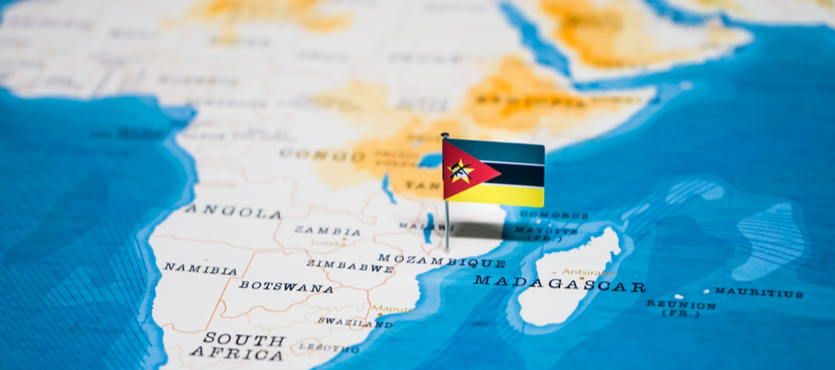President Filipe Nyusi’s government recently agreed to allow Portugese troops to re-enter his country for the first time in decades, in order to help suppress a growing ISIS insurgency. How much longer will it be before American contractors are allied upon to protect American interests in this African nation?
2020 was a very bad year for Mozambican security forces. Rebels briefly seized a large port city and threatened a $60 billion natural gas project. Additionally, according to reports, the rebels beheaded almost a hundred civilians in a remote village. As the humanitarian crisis expands as well, Nyusi has steadfastly refused foreign and regional aid. “We Mozambicans need to develop our own skills… nobody will do it for us,” he recently declared. But his resolve in this area may be wavering. Sometime during 2021, over 1,000 Portugese troops will join other international forces fighting alongside the Mozambicans.
Economic problems contribute directly to political problems in Mozambique. Many rebel fighters are jobless youth lured by the group’s promise that its radical form of Islam will be an “antidote” to current “corrupt, elitist rule.”
Trouble in Mozambique
Like many African nations, Mozambique straddles the line between the mostly Muslim north and mostly Christian south. So, this country is quite unstable. Making matters worse, Mozambique is simultaneously one of the richest countries in the world, and one of the poorest ones. It has substantial natural resources. But many of its people have very little money.
As a result, the country has a long history of political instability. In the 1960s, many European countries let go of their African colonies. But Portugal retained a tight grip on Mozambique. Rebel groups, primarily the Front for the Liberation of Mozambique (FRELIMO), fought a 10-year war that eventually drove the Portugese from Mozambique.
During the 1960s, the Portugese tried to raise living conditions in Mozambique, mostly in a vain attempt to keep power. Nevertheless, the country was ill-prepared for self-government. In 1977, FRELIMO leader Samora Machel, with help from the Soviet Union and Cuba, formed a one-party Marxist state. In response, anti-communist Mozambican National Resistance (RENAMO) began a military campaign of their own.
As Machel nationalized industries, most investors left, triggering widespread poverty. Additionally, Machel refused to provide social services to many rebel-controlled areas, which caused conditions to deteriorate further. By the late 1980s, the civil war had killed as many as a million people.
In 1986, Machel died in a plane crash. Some say his plane was sabotaged. Machel’s successor, Joaquim Chissano, immediately reversed course. He ended Marxism and opened peace talks with RENAMO.
For a while, things were looking up in Mozambique. Then, in 2000, a massive cyclone devastated much of the fledgling country’s infrastructure. Political instability and violence resumed. Finally, in 2015, a new crisis emerged.
The Cabo Delgado Insurgency
This province is in the extreme northeast of Mozambique. In the before times, its quiet coastal villages were a popular destination for tourists who wanted to get away from it all. But those days are gone now.
Ansar al-Sunna (Supporters of the Tradition), an ISIS-affiliated group, has been trying to establish a fundamentalist Muslim state in Cabo Delgado since the mid-2010s. Like its ISIS brethren elsewhere in the MENA (Middle East and North Africa) region, Ansar al-Sunna is extremely violent. Furthermore, the group is becoming increasingly aggressive. It launched almost twice as many attacks in 2020 as it did in 2019. In one of these attacks, militants seized a strategic island just off Cabo Delgado’s coast.
In a desperate attempt to stem the tide, Mozambique has hired mercenaries from across the globe, including the shadowy Wagner Group. According to many, the Kremlin exercises direct control over these mercenaries. Other groups include South Africa’s Dyck Advisory Group, which has a rather checkered past.
It is uncertain whether all these mercenaries are in-country to support Mozambique’s government or to claim a piece of the nation on behalf of their own countries.
Here is why all this matters. If the flow of oil from the Middle East stops, America’s economy would slow down significantly. But as for America’s allies in the Far East, their economies might shut down completely. Almost all Middle East tankers move through the western part of the Indian Ocean on their way to the Pacific. So, the United States has a dual interest in keeping East Africa’s coastline as conflict-free and stable as possible.
In other words, the foreign mercenaries currently in Mozambique might be there to prolong the fighting. If American contractors arrive to protect American interests, they will be there to help end fighting.
Injury Compensation Available
Like many Islamic militants, Ansar al-Sunna relies mostly on ambushes and terrorist acts, like bombings. So, all combat troops, wherever they are stationed and whatever their duties might be, are equally at risk for combat wounds.
If anything, contractors might be at greater risk. Militants usually attack soft military targets, like supply convoys and lightly-guarded installations. Contractors usually serve in places like these.
Occupational diseases, like toxic exposure and repetitive stress disorder, are often a problem too. Many of the aforementioned military bases do not have very good facilities. Additionally, there is basically no expert medical care in places like Mozambique. So, private military contractors have a good chance of getting sick, and given the lack of appropriate medical care, there is a good chance they will get sicker.
The Defense Base Act covers both kinds of injuries. These victims are entitled to wage replacement and medical bill payment. Usually, the DBA pays two-thirds of a victim’s average weekly wage for the duration of a temporary disability. Additionally, the DBA insurance company takes care of all reasonably necessary medical expenses. In addition to emergency care, these expenses include things like follow-up care, including future follow-up care, transportation expenses, and other ancillary costs.
For more information about the specific benefits available, contact Barnett, Lerner, Karsen, Frankel & Castro, P.A.

